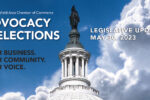Legislative Update: June 21, 2021
Here’s latest update from our Oregon State Chamber of Commerce (OSCC) legislative counsel, outlining what’s happening (OSCC Political Observations), activity on major issues, and what’s coming up. Any opinions expressed or implied are those of OSCC and do not necessarily reflect those of the Springfield Chamber or its representatives.
What’s Happening (OSCC Political Observations)

We are now entering into the final week of the 2021 legislative session. The legislature has until Sunday at 11:59pm to conclude its business.
Nearly all of the key decisions have been made and bills and budgets will be finalized and voted out of committee. We expect to see all of the “Christmas Tree” funding, ARPA, and Capital Construction budgets by Thursday morning.
The Senate is aiming to adjourn by the end of Thursday and the House has scheduled night floor sessions and is prepared to work over the weekend as needed.
Update on Legislation Impacting Local Business Communities
Paid Family Leave – Delayed Implementation (HB 3398)Legislation will pass to delay implementation of Oregon’s Paid Family Leave law. Under the law passed in 2019, the department is supposed to begin collecting the tax from employers to fund the program beginning in January 2022, with employees receiving benefits in 2023. Under HB 3398, the new tax would be delayed for one year – until January 2023 – with benefits being paid out later that fall.
Pass-Through Entity Taxes (SB 139)SB 139 is a mixed bag. For some small businesses, it will represent a tax reduction. For others, it will roll back the reduced tax rates for pass-through entities. The current bill would eliminate the reduced tax rate for pass-through entities with more than $5 million in annual net income.
Businesses with less than $500k in net income would get a tax reduction from 7.2% to 7%. And businesses with net income between $500k and $1 million would see a rate reduction from 7.6% to 7.5%.
All businesses – in order to qualify for the lower tax rates – would be subject to an owner-employee ratio test or a three year average limitation on distributions of income as a percentage of ordinary business income.
Again, this bill is a mixed bag. On one hand, it is a tax cut for a large number of small businesses. But overall, the bill does raise taxes and tax revenue overall at time when state government is swimming in more money than anytime in history.
Increased SALT Deduction (SB 727)The federal Tax Cuts and Jobs Act of 2017 eliminated the ability of taxpayers to deduct more than $10,000 in State and Local Taxes (SALT) from their federal taxes.
SB 727 allows a workaround for LLCs and pass through entities to pay an upfront entity-level tax to the state that would trigger the ability for pass through entities to claim the entirety of their State and Local Taxes on federal tax returns.
SB 727 is modeled after legislation passed in other states that the IRS has deemed a permissible workaround to allow pass through businesses to claim their full State and Local Tax deduction from their federal tax liability.
Small Business Development Centers (HB 5023)Small Business Development Centers received about a 25% increase in funding for the upcoming 2021-23 budget.
Current funding levels of $4.6 million were proposed to be cut by 50% under the Governor’s Recommended Budget. However, the legislature will not only restore those proposed cuts, it will add another $1 million to fund SBDC’s at a $5.6 million level.
Local Airport Funding (HB 2434)Local airports will see their revenue streams maintained with the passage of HB 2434, which eliminates the expiration of the 2-cent aviation fuel tax that has proven instrumental in allowing local airports to leverage a 9-to-1 match in FAA funding for safety and improvement projects at all local public use airports.
Unemployment Insurance Tax Fix (HB 3389)HB 3389 will finally pass. OSCC testified in favor and lobbied for this important bill to allow employers to defer payment (without penalties or interest) until June 30, 2022, of up to one-third of tax owed in 2021 if their tax rate increased by at least 0.5 percentage points between 2020 and 2021. The bill also provides a formula for employers to have a percentage of their tax bill forgiven depending on the rate of increase they experienced.
But perhaps most importantly, the bill attempts to hold employers most impacted by the pandemic harmless from future increases by excluding layoffs that took place during the 2020 pandemic when calculating an employer’s experience rating going forward.
The bill should save employers $2.4 billion in unemployment tax costs over the next decade.Clean Electricity (HB 2021)OSCC remains skeptical of HB 2021 as it effectively aims to eliminate natural gas a generating resource for electricity in Oregon by 2040 and make Oregon’s electricity grid reliant on hydro, solar and wind power. Our concern for the bill is ultimately the reliability issues we’ve witnessed in California with rolling brownouts and blackouts due to lack of available electricity supply in peak times.
Discover more from Springfield Bottom Line
Subscribe to get the latest posts sent to your email.





